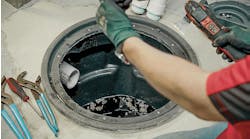This article is part of a three part series that takes a hard look at some of the business practices that have overrun the trades, including plumbing contractors. For better or worse, economic depression and the franchise model have affected the business model itself. Your grandfather wouldn’t recognize how service companies are run today. As eroding consumer trust and near panic level recruitment concerns come to forefront, we have to wonder how well these ‘best practices’ are working. The primary question that we pose in this series is whether the short term profitability of these tactics are worth the long term costs to the industry.
Why Training Matters
The regulations on how those who work under a master plumber are licensed, trained, or what responsibilities they are allowed to undertake at any stage of the job varies widely throughout the country. Most of the time it is up to the individual business owner to set those boundaries. Nothing except fear of liability is keeping the master plumber from sending a rookie out to a job way over his or her head.
Licensure is mostly handled at the state level, but is often limited to those who pull permits and own businesses. Enforcement of the regulations that are in place is often insignificant and scarce. As a result, in many areas a vast majority of those performing plumbing services are not licensed in any way. The quality of their service is not guaranteed by any measure or standard.
That is a risky scheme for us as an industry. There are a lot of technicians out there giving plumbers a bad name.
For generations plumbers have learned their trade the same way most tactile professions have, by apprenticeship. First developed in the later middle ages, apprenticeships have been building craftsman workforces ever since. Young and eager-to-learn individuals can build a career for themselves and get paid commensurate with their experience as they build ever-increasing value for their employer.
Setting Up an Apprenticeship
Once upon a time, an apprenticeship was little more than a social contract between two people. Now, of course, it’s a bit more complicated. A certified apprenticeship program must be registered with the U.S. Department of Labor and will often be influenced by both state and federal regulations. There is paperwork to be filled out and standards to be met, but all of that is in the name of creating a measure of quality on which we can all collectively hang our hats.
We desperately need this skilled workforce. According to the bureau of labor statistics, employment of plumbers, pipefitters, and steamfitters is currently growing 21%, almost twice as fast as the average for all occupations. In addition, most of our master plumbers belong to the retiring baby boomer generation.
The government knows that we are facing a deficit of skilled labor. They are concerned for our infrastructure, so, for better or worse, they have stepped in to help. And although there are some hoops to jump through to get an apprenticeship program set up in your company, there are also clear benefits.
A growing number of states are offering tax credits for companies who hire and train apprentices. These benefits range anywhere from $100 annual credit all the way up to 50% of annual wages. In addition, some states offer tuition support for registered apprentices. Again, these benefits vary widely and can be subject to eligibility.
The Department of Labor’s ApprenticeshipUSA website has a toolkit available to help companies create programs within their businesses. There is no fee for registering an apprenticeship program; it just requires some administrative work. If you aren’t interested in creating a program of your own, local trade organizations, associations, and unions may have apprenticeship programs that you can plug into.
While requirements vary by state, often a plumbing apprentice must practice between 6,000 and 10,000 hours under a Master Plumber prior to sitting for the Journeyman's exam. ApprenticeshipUSA will help you create a progressive checklist of skills and knowledge that the apprentice should display over time.
The on-the-job training is then supported by formal education. This can be in-house, online, or traditional classroom style. During these classes, the apprentice participates in a focused curriculum intended to prepare them for the journeyman’s test at the end of their apprenticeship period. An excellent resource for the formal education piece is Plumbing-Heating-Cooling Contractors eLearning program, which is already approved in many states.
Registered apprenticeship through ApprenticeshipUSA ensures a system structured to successfully facilitate the transfer of knowledge from experienced employees to new recruits. Progression through necessary skill sets are tracked and measured. In short, it implements a quality training program that no small business could hope to replicate on its own.
Apprenticeships Work
Data from ApprenticeshipUSA shows that this model is working. A survey of businesses show that 97% would recommend apprenticeship to others and that the average retention for apprentices completing programs is 91%. Companies report that a high proportion of apprentices go on to take on management roles within the company.
In fact, most participating companies believe that once an apprenticeship program is implemented, training apprentices is more cost-effective than hiring skilled staff. On average, for every $1 employers spend on apprenticeships, they get $1.47 back.
Competitive Advantage
The good news is that you can use this investment of resources to your advantage. Far more than just sleeping better at night knowing that you are building your own future workforce, you can use an apprenticeship program as a competitive advantage. It’s a marker of differentiation. 81% of consumers favor using a company that takes on apprentices. That’s a huge advantage you could have over your competition.
If you are going above and beyond to make sure you have the best-trained employees in your area, that should be prominent in your marketing. Talk about your apprenticeship program every chance you get including in the press, on your website, on forums, and at your Chamber of Commerce.
Doing this tells a story about a company with old-fashioned values that gives back to their community. It gives you a talking point that isn’t about pricing, product or service. Apprenticeship breeds trust with your stakeholders. Mostly, though, it gives you a tangible thing to point to when separating yourself from the hacks giving the industry a bad name.
Anja Smith is the managing partner of All Clear Plumbing Upstate, a service plumbing company in the Upstate region of South Carolina, where she oversees day-to-day operations, growth management, community relations, and marketing. All Clear is a family run organization that thrives under the joint efforts of a Master Plumber, a career banker, and marketing-focused business mind, also known as a husband, wife, and daughter. You can learn more about All Clear Plumbing's business philosophy at AllClearPlumbingUpstate.com.


